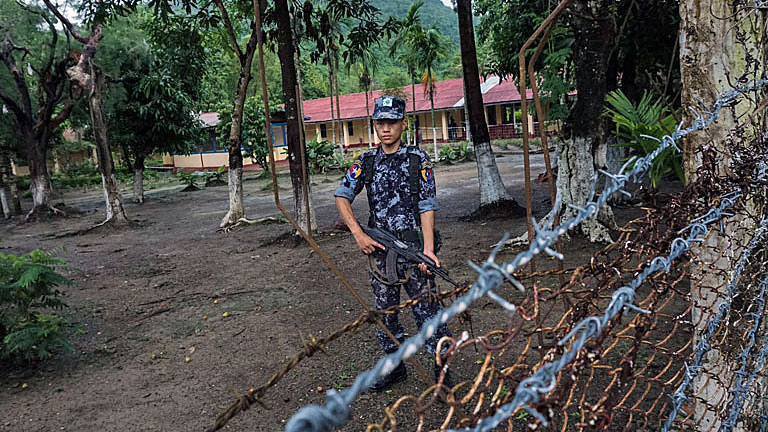Myanmar denies plan to establish Buddhist militias in troubled Rakhine state
| Publisher | Radio Free Asia |
| Publication Date | 16 August 2017 |
| Cite as | Radio Free Asia, Myanmar denies plan to establish Buddhist militias in troubled Rakhine state, 16 August 2017, available at: https://www.refworld.org/docid/5a9426fca.html [accessed 8 June 2023] |
| Disclaimer | This is not a UNHCR publication. UNHCR is not responsible for, nor does it necessarily endorse, its content. Any views expressed are solely those of the author or publisher and do not necessarily reflect those of UNHCR, the United Nations or its Member States. |
2017-08-16
 A border policeman stands guard at the Kyikanpyin border station's command center in Maungdaw township, western Myanmar's Rakhine state, July 14, 2017. AFP
A border policeman stands guard at the Kyikanpyin border station's command center in Maungdaw township, western Myanmar's Rakhine state, July 14, 2017. AFP
Myanmar's government on Wednesday denied reports that it would train and arm ethnic Rakhine Buddhists in the country's troubled Rakhine state, where residents have demanded the establishment of local militias following a string of deadly attacks in the region.
Earlier on Wednesday, local media quoted San Shwe Kyaw, ruling National League for Democracy (NLD) chairman for Rakhine's Sittwe township, as saying on Aug. 15 that the government would launch a "large-scale" military operation in northern Rakhine's Maungdaw township and that People's Militias would be formed to fight against ethnic Rohingya Muslim "insurgents."
"The people asked the government to establish armed groups in the form of People's Militias," Mizzima News quoted him as saying, referring to public demonstrations staged in 15 townships in Rakhine on Aug. 13 calling for paramilitaries to combat terrorism.
"The government is planning to provide military training to local people soon and they will be armed in the form of People's Militias with the concept of military training for all," he said, adding that "we are very much pleased with this plan."
Following the reports, director general of the President's Office Zaw Htay delivered a message to reporters in the capital Naypyidaw denying plans to establish militias in northern Rakhine.
He acknowledged that the military leadership is in discussions with Myanmar's state counselor and de facto leader Aung San Suu Kyi to conduct an operation in the Mayu mountain range in the Maungdaw-Buthidaung area, where villagers and patrolmen have discovered camps thought to be used by Muslim "terrorists" in recent weeks.
But he reiterated an earlier statement by the NLD government after taking office in 2016 that it has no plan in place to form civilian militia groups in Rakhine, adding that doing so would be out of line with the policies of both the central and Rakhine state governments.
"We are focusing on combatting terrorism and maintaining the security of area residents," he said.
"But as far as forming People's Militias, I want to make it clear that it is not the policy of the government."
The Irrawaddy online journal quoted Sittwe district NLD chairman Thinn Kha Kyaw on Wednesday as saying that San Shwe Kyaw's statement did not represent the party.
"San Shwe Kyaw is not a spokesperson [for the NLD in Rakhine state]," he told the Irrawaddy.
"We only knew about [his statement] after the media reported it. It is just his personal view."
San Shwe Kyaw on Wednesday denied that he had said militia groups would be established in the region.
"What I said is that I would be happy as a citizen if militia groups are formed in Rakhine state – I didn't say it would be formed," he told RFA's Myanmar Service.
"People are demanding the formation of militia groups in Rakhine state, and I agreed, as I am one of these people."
Volatile region
Rakhine's Maungdaw, Buthidaung, and Rathedaung townships have been in a state of upheaval since security forces unleashed a crackdown following deadly attacks on three border guard stations on Oct. 9, which were blamed on a group of Rohingya Muslim militants calling themselves the Arakan Rohingya Salvation Army.
Ethnic Rakhine residents and several ethnic Rakhine political parties have regularly called for the establishment of local militias following the Oct. 9 attacks.
Though the crackdown ended in February, security forces continue to patrol the tri-township area where disappearances, murders, attacks on patrolmen, and periodic killings by troops continue to occur.
Seven farmers from the Myo minority, a sub-ethnic group of the state's ethnic Rakhine people, were reportedly murdered by the Arakan Rohingya Salvation Army in Maungdaw's Kinegyi village in late July, prompting many ethnic Rakhine Buddhists and Myo to flee their homes.
The military said last week that it had sent hundreds of soldiers to the region following the discovery of the farmers, who had been hacked to death.
Myanmar considers the Rohingya illegal immigrants from neighboring Bangladesh and has denied them citizenship and access to basic services, even though many have lived in the country for generations.
About 120,000 other Rohingya live in internally displaced persons camps in Rakhine where they were placed following deadly communal violence with Rakhine Buddhists in 2012.
An estimated 90,000 Rohingya fled the area during the October-February crackdown, some of whom claimed to be the victims of atrocities committed by security forces.
Reported by Waiyan Moe Myint. Translated by Khet Mar. Written in English by Joshua Lipes.
Link to original story on RFA website
